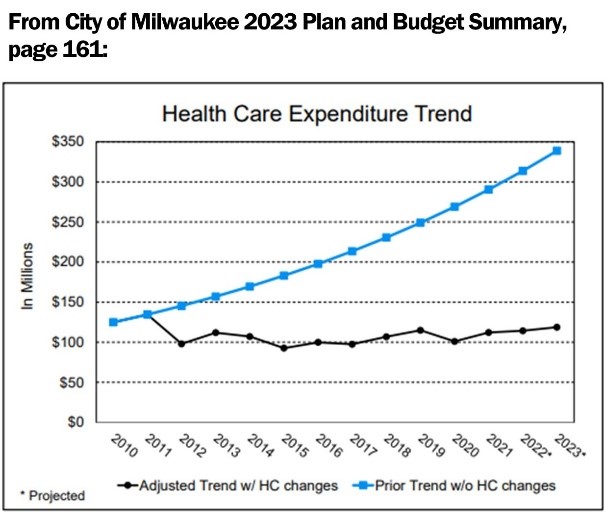This post originally appeared at https://www.badgerinstitute.org/in-act-10-fight-unions-dont-just-want-you-to-pay-they-want-power/
Huge taxpayer savings are at risk, but beyond that is the question of who controls government, voters or organizers
The unions’ lawsuit to overturn Wisconsin’s “Act 10” 2011 labor reforms isn’t primarily about money.
Money is involved. When the Legislature and then-Gov. Scott Walker took away most of the control that public employee unions exerted over state and local governments, they said it was to arrest overspending by reducing employee benefit costs.

Mission accomplished: The reforms so far have saved taxpayers $16.8 billion, according to the MacIver Institute’s running tally. In 2011, Wisconsinites had the 10th harshest state and local tax burden in the country. We’re now at 24th.
But as much as the seven unions suing to overturn the reforms would appreciate shaking that $16.8 billion back out of taxpayers’ pockets, their first concern isn’t the cash. It’s power. They say so in their suit.
Several plaintiffs are union locals complaining they don’t get to bargain for employees they say they represent — because a majority of those employees don’t permit it. Unlike the old days, when a single election was enough to put a union in place indefinitely, Act 10 requires unions to ask workers to vote once a year. Unions need to get only 51% of workers to say yes.
Union leaders dislike that. In Abbotsford, where half the teachers did not want unionization enough to vote at all, the union complains it’s unfair to have to round up votes. One plaintiff, a union boss in the Beaver Dam schools, complains that he must spend “considerable time and effort towards contacting employees and organizing get-out-the-vote campaigns.” An organizer in Racine complains that if not for annual votes, he’d have time to unionize more staff. A local that wants to unionize graduate students in Madison complains it’s not worth the effort of contesting “anti-democratic recertification elections” each year.
Facing a vote is ‘anti-democratic’?
Right now, just over half of Wisconsin’s school districts no longer have teachers unions certified to bargain a contract. That is entirely because, in those districts, a union couldn’t get enough teachers to say yes. Since when is having to face voters “anti-democratic”?
But unions feel indignant. Having to keep one’s customers happy enough to retain their patronage might be fine for grocers or chiropractors, but it’s beneath something so elevated as a union.
Unions also complain that the reforms limited bargaining to pay, when once they had the power to dictate the use of things like a union-linked and overpriced health insurer, WEA Trust. That insurer got out of the business last year. Its model collapsed once districts were free to seek better terms. More broadly, Act 10 took from unions their power to shield members from what is normal for everyone else: paying some share of health coverage and retirement costs. Now, government employees must chip in something, albeit less than you. While the average private-sector worker paid 27% of the cost of her health care, Act 10 requires only 12.5% from government workers.

But even this cost sharing and latitude about vendors makes for huge savings. The City of Milwaukee saw 8-9% increases in employee health costs annually leading up to 2011. Since then, according to city budget documents, costs have flatlined, employees’ costs have risen minimally, and the city expects to save at least $200 million this year on health care relative to the previous trend.
Dictating terms to voters
When unions talk of overturning Act 10 to restore their “ability to bargain,” what they mean is to regain the power to dictate terms. Unions’ premise is that collective action lets workers stand up to The Boss. Ordinarily that’s a legitimate aim, but for public sector unions, The Boss happens to be you, the taxpayer.
Or, as no less a progressive deity than President Franklin Roosevelt wrote in 1937 on the need to limit government unions’ power, “the employer is the whole people, who speak by means of laws.”
What unions are trying to take back is power, from voters and their Legislature. That $16.8 billion is just the start if they regain control.
No law is permanent, and if unions persuaded enough voters that Act 10 is as unjust as they say, those voters would elect officials who’d repeal it, that being how democracy works. Unions failed at this already and have given up trying.
Instead, unions are re-litigating a law that already prevailed over constitutional objections in federal and state courts up to the Supreme Court level. The difference is that last spring’s Supreme Court election, fought mostly about abortion, produced a one-vote progressive majority that unions figure will side with them.
Walker pointed out the problem with that in an August talk in Milwaukee.
If the Supreme Court were to undo Act 10, he said, “that’s just a horrible precedent.” It means that “if someday a Democrat-controlled Legislature and a Democrat governor pass something, and then some time after that a conservative leaning majority come in … they’d say, ‘Oh, we’re going to throw that out.’”
Which would be, to repeat a phrase, anti-democratic and a terrible misuse of courts’ power.
Patrick McIlheran is the Director of Policy at the Badger Institute. Permission to reprint is granted as long as the author and Badger Institute are properly cited.
var gform;gform||(document.addEventListener(“gform_main_scripts_loaded”,function(){gform.scriptsLoaded=!0}),window.addEventListener(“DOMContentLoaded”,function(){gform.domLoaded=!0}),gform={domLoaded:!1,scriptsLoaded:!1,initializeOnLoaded:function(o){gform.domLoaded&&gform.scriptsLoaded?o():!gform.domLoaded&&gform.scriptsLoaded?window.addEventListener(“DOMContentLoaded”,o):document.addEventListener(“gform_main_scripts_loaded”,o)},hooks:{action:{},filter:{}},addAction:function(o,n,r,t){gform.addHook(“action”,o,n,r,t)},addFilter:function(o,n,r,t){gform.addHook(“filter”,o,n,r,t)},doAction:function(o){gform.doHook(“action”,o,arguments)},applyFilters:function(o){return gform.doHook(“filter”,o,arguments)},removeAction:function(o,n){gform.removeHook(“action”,o,n)},removeFilter:function(o,n,r){gform.removeHook(“filter”,o,n,r)},addHook:function(o,n,r,t,i){null==gform.hooks[o][n]&&(gform.hooks[o][n]=[]);var e=gform.hooks[o][n];null==i&&(i=n+”_”+e.length),gform.hooks[o][n].push({tag:i,callable:r,priority:t=null==t?10:t})},doHook:function(n,o,r){var t;if(r=Array.prototype.slice.call(r,1),null!=gform.hooks[n][o]&&((o=gform.hooks[n][o]).sort(function(o,n){return o.priority-n.priority}),o.forEach(function(o){“function”!=typeof(t=o.callable)&&(t=window[t]),”action”==n?t.apply(null,r):r[0]=t.apply(null,r)})),”filter”==n)return r[0]},removeHook:function(o,n,t,i){var r;null!=gform.hooks[o][n]&&(r=(r=gform.hooks[o][n]).filter(function(o,n,r){return!!(null!=i&&i!=o.tag||null!=t&&t!=o.priority)}),gform.hooks[o][n]=r)}});
Submit a comment
“*” indicates required fields
document.getElementById( “ak_js_1” ).setAttribute( “value”, ( new Date() ).getTime() );
/* = 0;if(!is_postback){return;}var form_content = jQuery(this).contents().find(‘#gform_wrapper_21’);var is_confirmation = jQuery(this).contents().find(‘#gform_confirmation_wrapper_21’).length > 0;var is_redirect = contents.indexOf(‘gformRedirect(){‘) >= 0;var is_form = form_content.length > 0 && ! is_redirect && ! is_confirmation;var mt = parseInt(jQuery(‘html’).css(‘margin-top’), 10) + parseInt(jQuery(‘body’).css(‘margin-top’), 10) + 100;if(is_form){jQuery(‘#gform_wrapper_21’).html(form_content.html());if(form_content.hasClass(‘gform_validation_error’)){jQuery(‘#gform_wrapper_21’).addClass(‘gform_validation_error’);} else {jQuery(‘#gform_wrapper_21’).removeClass(‘gform_validation_error’);}setTimeout( function() { /* delay the scroll by 50 milliseconds to fix a bug in chrome */ }, 50 );if(window[‘gformInitDatepicker’]) {gformInitDatepicker();}if(window[‘gformInitPriceFields’]) {gformInitPriceFields();}var current_page = jQuery(‘#gform_source_page_number_21’).val();gformInitSpinner( 21, ‘https://www.badgerinstitute.org/wp-content/plugins/gravityforms/images/spinner.svg’, true );jQuery(document).trigger(‘gform_page_loaded’, [21, current_page]);window[‘gf_submitting_21’] = false;}else if(!is_redirect){var confirmation_content = jQuery(this).contents().find(‘.GF_AJAX_POSTBACK’).html();if(!confirmation_content){confirmation_content = contents;}setTimeout(function(){jQuery(‘#gform_wrapper_21’).replaceWith(confirmation_content);jQuery(document).trigger(‘gform_confirmation_loaded’, [21]);window[‘gf_submitting_21’] = false;wp.a11y.speak(jQuery(‘#gform_confirmation_message_21’).text());}, 50);}else{jQuery(‘#gform_21’).append(contents);if(window[‘gformRedirect’]) {gformRedirect();}}jQuery(document).trigger(‘gform_post_render’, [21, current_page]);gform.utils.trigger({ event: ‘gform/postRender’, native: false, data: { formId: 21, currentPage: current_page } });} );} );
/* ]]> */
The post In Act 10 fight, unions don’t just want you to pay — they want power appeared first on Badger Institute.